First of all, a happy New Year – we at CSTonline hope you have all had a good winter break. And while we certainly agree with more pessimistic assessments that see 2025 as not looking to be off to a promising start – with everything happening in the world right now – we are of the conviction that we can’t just throw our hands in the air and give in to resignation.
Hence, for a more positive note, we thought it might be good to provide a bit of an update and recap of the work going on at CSTonline to keep the lights on, while also thinking about ways to improve the blog over time… so with the next couple of paragraphs, we’ll delve a bit deeper into changes that we’ve implemented over the past years, ranging from a move to new social networks, to revamping the hosting sitting underneath the website that are reading just now, and considering issues of sustainability to ensure that the more than 1,800 blog posts kindly shared by our wonderful contributors remain accessible and are being archived and indexed in a proper way.
Alright, here we go – let’s start with a bit of history first …
CSTonline.net – looking back … and towards the future
As many of you, dear friends of CSTonline, might know, this blog has evolved quite a bit during the past 20 years, accompanied by at least three major design revamps that also reflect the change of purview conceived by the Editors. As Kim had announced back in 2011, the site, which during its first seven years had been reachable via the criticalstudiesintelevision.com domain, had undergone a substantial upgrade to accommodate proper blogging functionality, while also diversifying its operations between what now is known as the Critical Studies in Television journal, and the CSTonline blog.
The site that had initially been known as Critical Studies in Television had been moved first to cstonline.tv (ca. 2011), which then was soon to become cstonline.net …
Toby reminiscing about how he came on board: Hoping that my foggy memory of that time still serves me right, I remember having approached both Janet and Kim back in 2011 during my time studying for a Television MA at Birkbeck, to ask if they might have use for a helping hand with the blog. Kim directly took me up on that, and from then on out, we have been busy with keeping our beloved little blog afloat. Navigating the wild waters of the evolving web landscape, we’ve made a number of attempts to address emerging technical challenges by upgrading the blog’s capabilities and underlying hosting. During the past years, and with the initial institutional support waning, this meant the website structure had to be moved again and again. I don’t want to bore you, dear reader, with too much detail here … but allow me to take the opportunity and particularly thank the good folks at Reclaim Hosting for their tireless support during the past three years.
Back in December, we decided to move the website hosting that supports CSTonline over to Switzerland-based hoster Infomaniak. Next to priding themselves on being an ethical hoster, Infomaniak’s very flexible and data privacy-respecting hosting package seems to be well-suited for all our intents and purposes. And with the migration now having been successfully completed, we hope this new set up will help us with getting rid of the increasing numbers of gremlins in the works that we’ve been fighting these past few years.
Social media
For quite some time, we have been pondering questions of how to continue interactions across the various social networks, and feel that particularly the recent deterioration of social media hubs that CSTonline has used for quite some time meant that a decision would become more urgent.
Most notable for us in that respect are the dedicated CSTonline Facebook group, and Twitter profile – and yes, Toby still refuses to call that platform by its new, utterly ridiculous, name. As both of us feel that both platforms have taken a decidedly libertarian-slash-right-wing turn particularly during the last 18 months, and with their respective owners now being hell-bent on continuing that trend, this has led to a larger social movement seeking to leave those networks behind – including academics (see this recent LSE blog for more details).
At CSTonline, we are committed to not feeding these trolls, so for CSTonline’s social media engagement, this has meant that we have ceased our activities on Twitter, and have begun to look into establishing presences on Bluesky and Mastodon as alternative platforms of engagement.
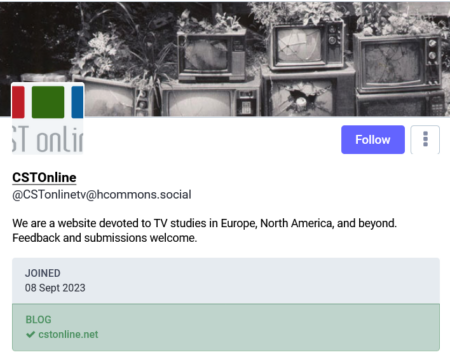
Fig. 4: CSTonline on Mastodon …
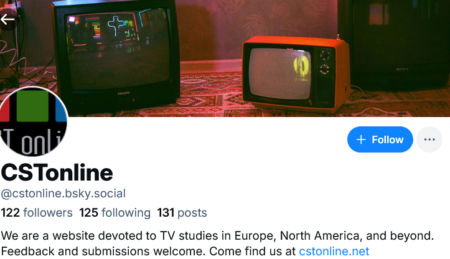
Fig. 5: … and on Bluesky.
We warmly invite all of you, dear readers, to explore those alternatives together with us, while also keeping in mind that those good old days of the central town square for open debate that Twitter used to be around ca. 2015 are now likely gone for good … to go with Bob Dylan here, the times they are a’changing …
Long(er)-term archiving of blog posts
With Critical Studies in Television and CSTonline having been around for the past two decades, we realised that it might make sense to start thinking about ways to ensure the longevity of our community’s valuable contributions to the wider academic discourse on all things television. And while preservation of journal content has been becoming more and more mainstream these past few years, archiving for blogs has been lagging behind. An additional barrier for any community initiative such as ours is the cost factor – with academic blogs being run almost exclusively via volunteer labour, the corresponding lack of a formal budget makes it difficult to invest in paid-for services that could be tasked with taking care of archiving.
Luckily, there are a number of specialist non-profits around that provide community-led services to support the archiving of web content … with the most notable of these being the Internet Archive.[1] And while CSTonline snapshots of the blog’s whole site have been available on Internet Archive for quite a while, we have also been exploring options to more directly archive our contributors’ blog posts in a dedicated fashion. To facilitate this, we have begun working with rogue-scholar.org, a recently-launched service seeking to improve “blogs in important ways, including full-text search, long-term archiving, DOIs and metadata, and communities”. Thanks to the support kindly provided by Martin Fenner, the mastermind behind rogue-scholar, our blog has been set up in rogue-scholar’s systems, and all blogs are now indexed in rogue-scholar’s database, with DOIs being provided for free for all of CSTonline’s blog posts via the system’s integrated registration feature, which in turn will help to improve the findability of our contributors’ blog post.
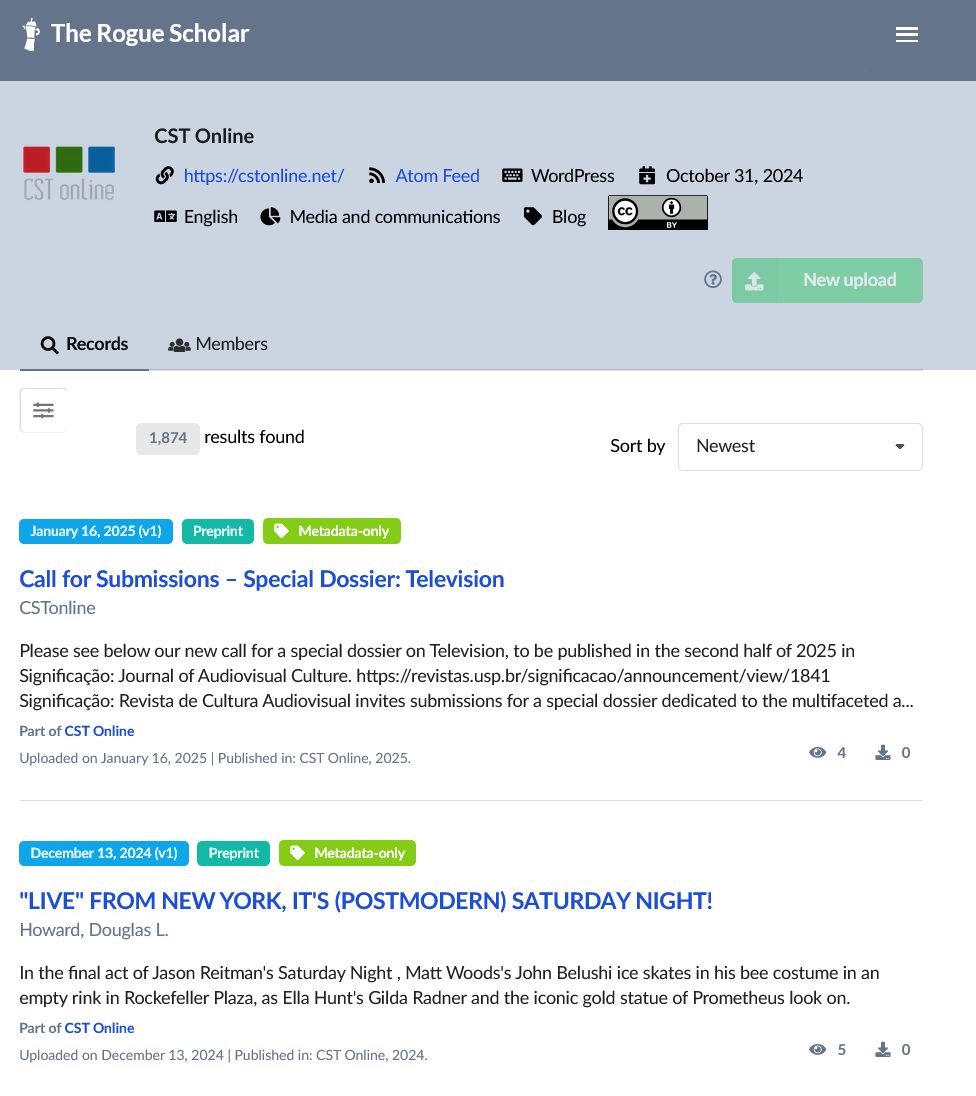
Fig. 6: CSTonline blog posts indexed on the rogue-scholar database.
Outlook
All in all, we hope these improvements will contribute to making CSTonline an even more useful source of multifaceted perspectives and reflections on the global state of television studies past, present, and future.
Sarah reminiscing about how she came on board quite recently: The CSTonline blog has been a wonderful refuge over the past few years while I was working on my PhD, a place I would seek out whenever I had writer’s block and wanted to see what academics and those obsessed with television were thinking and writing about for fun. After meeting Kim and Toby (virtually) at the end of last year and learning about the work and care (!) that goes into such a long-running endeavour, and now that I have the honour of learning the ropes and getting to help out with getting those blogs online (which means early access, an absolute dream!), my gratitude for this ever-growing collection of thoughts, analyses, reports, reviews, and debates—and for the people making sure that all of this stays accessible—knows no bounds.
This is also an opportunity for us to reiterate our standing invitation, welcoming new blogs on any aspect of television, ranging from conference reports, reviews, immediate responses to current debates within TV, or short academic pieces that you would like to share with the wider CSTonline audience. Please refer to our blog submission guidelines for further details, and don’t hesitate to send us your blog.
Kim reminiscing about the wonderful support she has received over the years. It would be remiss of me not to mention the willing helpers that got CSTonline to where it is (before Toby came on board and then Sarah). First of all Dr Debra Ramsay ably assisted the uploading of blogs in the early days. Once she moved onto a full time post, Dr Lisa Kelly took over, until she too took a full time position. Suffice it to say, I could not have got CSTonline to where it is without them. Everyone has volunteered – no money changes hands and, as Toby says, we still run this blog on love and a shoestring.
I have to also give thanks to my husband who gave me the re-designed site for my 50th birthday. Strange present but it did mean that all the design and functionality was free to me. Thank you Jon.
We know that things have moved on in the academic world. Whereas, in the old days, people were eager to blog, to share research news, to run research ideas past colleagues before turning them into longer, peer-reviewed pieces, it has become harder and harder to find time to write anything that does not ‘count’. In my humble opinion, blogging still counts. People read CSTonline regularly and, if blogging isn’t valued in the ever increasingly squeezed and pressurized field of higher education, it does count for our many readers. As Sarah says, keep ’em coming and we’ll keep publishing them.
My big thanks are to Toby for working so hard to keep the site running and for facilitating the archiving of blogs. And to Sarah, for coming on board to relieve Toby and me from the weekly editing and uploading of the blogs. You could not have come at a better time.
And last, thanks to everyone who reads us. We would not be here without you all.
Footnote
[1] See ctonline.net backup on Internet Archive here, and a recent overview of Internet Archive’s Scholar search database here.


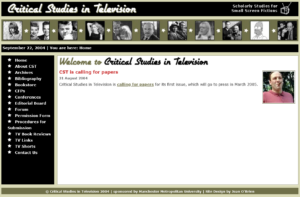

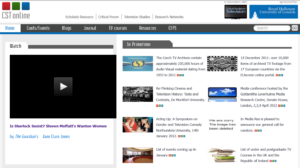

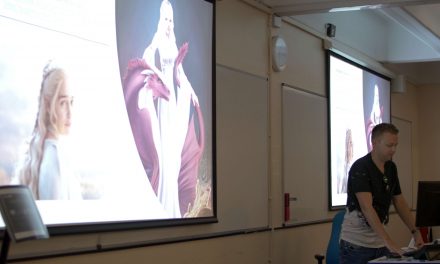

A fascinating read – thank you so much for this! Both for the history and how we’re considering the here and now and the future. The fact that there’s more and more of history all the time – in fact, there’s another bit of it when I was typing just now – means that we need more and more space to store it all, *and* a means of accessing it again, otherwise there’s precious little point in storing it in the first place. And to see something like this recounting and ruminating on something so real, immediate and tangible has been very thought-provoking and bit different.
Thank you Toby. Thank you Sarah. Thank you Kim. Thank you everyone else. I think you know that I’m deeply appreciative of all your hard work… but in case you’ve forgotten let me say again: I’m *deeply* appreciative of all your hard work. And I hope that people continue to enjoy it – as I’ve done – for many years to come!
All the best 🙂
Andrew